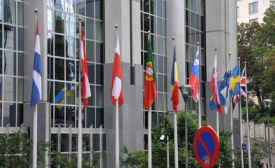soft power
European Commission President José Manuel Barroso was right. Had the European Union instead of the United States fallen into partial government shutdown, the world would not have hesitated to use this as an opportunity to berate Europe and its influence as a global leader. The trade in caricatures about the EU is a favourite past time. World leaders stand ready to offer free advice to European governments and institutions that they see as having no capacity to lead.

This piece was co-authored by Jan Melissen.
BRUSSELS - European Commission President José Manuel Barroso was right. Had the European Union instead of the United States fallen into partial government shutdown, the world would not have hesitated to use this as an opportunity to berate Europe and its influence as a global leader.
This Saturday, Chinese President Xi Jinping will launch what is being billed as the most important conclave of Chinese leaders since 1978, the year that Deng Xiaoping transformed China from a dying Red giant into a market-driven dynamo. (“Seek truth from facts,” rather than communist ideology, he said.) The historic “Third Plenum” of Xi's term is meant to signal that he has consolidated power, decided on a direction for the country, and achieved consensus with the political class.
As of today, neither the United States nor Israel has a vote in UNESCO -- the United Nations’ organization that leads global initiatives on everything from HIV/AIDS and climate change to literacy and Holocaust education. (Its name is short for United Nations Educational, Scientific and Cultural Organization.) The downgrade is the result of two sets of laws that the United States and UNESCO have had for years.
Soft on the outside, hard on the inside. That may be the best way to describe the often startling contrast between Iran's current foreign and domestic policies. Since taking office in August, President Hassan Rohani has won widespread praise for showing greater flexibility in nuclear talks with the international community.
For presidents, like sports-team managers, the tough weeks tend to outnumber the jubilant. But even by the standards of an unforgiving job, Barack Obama could be forgiven for feeling unusually buffeted of late. Many of the blows have come on the domestic front, with the all-consuming stand-off of the government shutdown segueing into frantic efforts to defend and repair the roll-out of Obamacare amid charges of fatal technological incompetence.
If such a thing is possible, Shanghai today beckons even more powerfully than it did in the past, playing a critical role among the great cities of the world beyond anything that could have been imagined. Shanghai’s future shines brilliantly, given its own dynamic economy and the larger Chinese economy of which it is a critical part. However, as China’s most prosperous city, Shanghai should not be afraid to strike out on its own or, more accurately, to define the terms of its development in its own way and according to its own history and understanding of its future.







